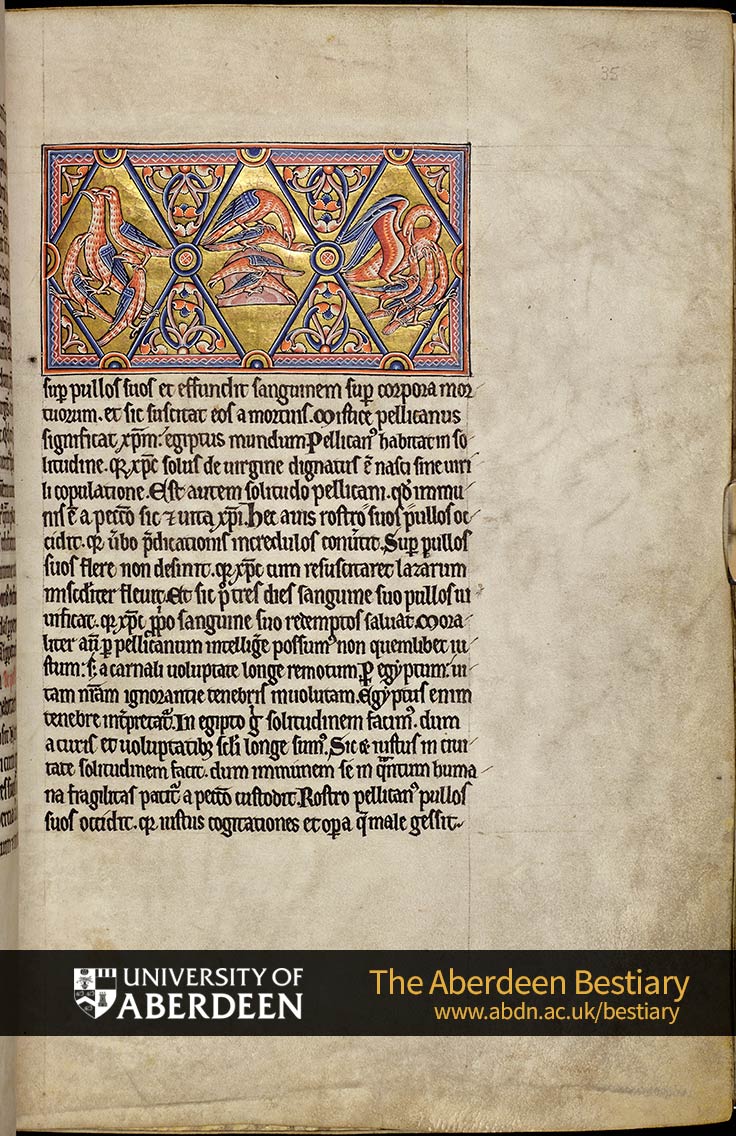Folio 35r - the pelican, continued.
on her young and lets her blood pour over the bodies of the dead, and so raises them from the dead.
In a mystic sense, the pelican signifies Christ; Egypt, the world. The pelican lives in solitude, as Christ alone condescended to be born of a virgin without intercourse with a man. It is solitary, because it is free from sin, as also is the life of Christ. It kills its young with its beak as preaching the word of God converts the unbelievers. It weeps ceaselessly for its young, as Christ wept with pity when he raised Lazarus. Thus after three days, it revives its young with its blood, as Christ saves us, whom he has redeemed with his own blood.
In a moral sense, we can understand by the pelican not the righteous man, but anyone who distances himself far from carnal desire. By Egypt is meant our life, shrouded in the darkness of ignorance. For Egiptus can be translated as 'darkness'. In Egypt, therefore, we make a wilderness (see Joel, 3:19), when we are far from the preoccupations and desires of this world. Thus the righteous man creates solitude for himself in the city, when he keeps himself free from sin, as far as human frailty allows.
The pelican kills its young with its beak because the righteous man considers and rejects his sinful thoughts and deeds
- Commentary
-
Commentary
Text
The Pelican. Pelicans live in Egypt, and are devoted to their young. The fledglings fight their parents who kill them The mother bird pierces her side and as her blood flows over the bodies of her babies, they return to life.
Illustration
the narrative is divided into three scenes showing the babies attacking their parent, the parents killing the babies and the mother piercing her side to resurrect her offspring. Possibly the idea of mother pouring sustenance over her babies comes from the birds' habit of regurgitation. Folio mark of three horizontal 'match sticks' in top right corner.
Folio Attributes
- Transcription and Translation
-
Transcription
super pullos suos et effundit sanguinem super corpora mor\tuorum, et sic suscitat eos a mortuis. Mistice pellicanus\ significat Christum, Egiptus mundum. Pellicanus habitat in so\litudine, quia Christus solus de virgine dignatus est nasci sine viri\li copulatione. Est autem solitudo pellicani, quod immu\nis est a peccato sic et vita Christi. Hec avis rostro suos pullos oc\cidit, quia verbo predicationis incredulos convertit. Super pullos\ suos flere non desinit, quia Christus cum resuscitaret Lazarum\ misericorditer flevit. Et sic post tres dies sanguine suo pullos vi\vificat, quia Christus proprio sanguine suo redemptos salvat. Mora\liter autem per pellicanum intelligere possumus non quemlibet iu\stum, sed a carnali voluptate longe remotum. Per Egyptum, vi\tam nostram ignorantie tenebris involutam. Egyptus enim\ tenebre interpretatur. In Egipto igitur solitudinem facimus, dum\ a curis et voluptatibus seculi longe sumus. Sic et iustus in civi\tate solitudinem facit, dum immunem se in quantum huma\na fragilitas patitur a peccato custodit. Rostro pellicanus pullos\ suos occidit, quia iustus cogitationes et opera que male gessit,\Translation
on her young and lets her blood pour over the bodies of the dead, and so raises them from the dead. In a mystic sense, the pelican signifies Christ; Egypt, the world. The pelican lives in solitude, as Christ alone condescended to be born of a virgin without intercourse with a man. It is solitary, because it is free from sin, as also is the life of Christ. It kills its young with its beak as preaching the word of God converts the unbelievers. It weeps ceaselessly for its young, as Christ wept with pity when he raised Lazarus. Thus after three days, it revives its young with its blood, as Christ saves us, whom he has redeemed with his own blood. In a moral sense, we can understand by the pelican not the righteous man, but anyone who distances himself far from carnal desire. By Egypt is meant our life, shrouded in the darkness of ignorance. For Egiptus can be translated as 'darkness'. In Egypt, therefore, we make a wilderness (see Joel, 3:19), when we are far from the preoccupations and desires of this world. Thus the righteous man creates solitude for himself in the city, when he keeps himself free from sin, as far as human frailty allows. The pelican kills its young with its beak because the righteous man considers and rejects his sinful thoughts and deeds

